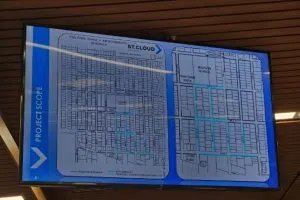MINNEAPOLIS (AP) — A jury has been seated for the trial of a former Minneapolis police officer in George Floyd’s death, with opening statements set for March 29 in a case that led to weeks of protests and a national soul-searching about racial justice.
The final juror was chosen Tuesday, wrapping up a process that took more than two weeks and was complicated by worldwide attention to Floyd’s death, even before the city of Minneapolis announced a $27 million settlement to his family early in the process.
Attorneys and the judge worked through more than 100 people, dismissing most because they acknowledged strong views about an encounter that was captured on bystander video.
The panel now includes 15 jurors. Twelve will deliberate, with two alternates; Hennepin County Judge Peter Cahill has said he will excuse the extra juror when opening statements begin on Monday if the 14 others still are able to serve.
Derek Chauvin is charged with murder and manslaughter in the May 25 death of Floyd. The Black man was declared dead after Chauvin, who is white, pressed his knee against his neck for about nine minutes while he was handcuffed and pleading that he couldn’t breathe. The widely seen video set off street protests in Minneapolis, some violent, that spread across the U.S. and the world.
The final juror chosen, a white man in his 20s, is a married accountant who said he had a somewhat negative opinion of Chauvin, saying it seemed like the length of his restraint on Floyd was longer than necessary. But he said he would be able to put that aside and weigh the case based on the evidence.
He said Floyd’s death sparked discussions about racism at work, and he decided to educate himself by reading a book about the subject. He said he has a healthy respect for police and views Black Lives Matter somewhat favorably. However, he said some of the frustrations boiled over and may have been a factor in violent unrest in Minneapolis.
He also said he understands that professional athletes who kneel during the national anthem are trying to start a dialogue on race, but “I would prefer if someone would express their beliefs in a different manner.”
Several other potential jurors were dismissed earlier in the day, including a former truck driver who called a movement to defund the police “lunacy” and said he would likely believe police officers over citizens.
Throughout jury selection, the defense frequently struck people who told the court they already had strong feelings about Chauvin’s guilt. The prosecution frequently used its allotted challenges against potential jurors who were not just supportive of police but said they would favor their testimony over others. They also sought to block potential jurors who were critical or doubtful about the Black Lives Matter movement.
Both sides now gear up for opening statements on Monday. Legal experts have said the bystander video – already seen by almost everyone on the jury – is compelling footage but that a conviction is not a slam-dunk for prosecutors.
The defense has made clear that they will make an issue of Floyd swallowing drugs before his arrest, seeking to convince the jury that he was at least partially responsible for his death. Defense attorney Eric Nelson won a partial victory when Cahill said he would allow some evidence from Floyd’s 2019 arrest in Minneapolis in which he also swallowed drugs. In the 2019 case, paramedics were called to the scene and noted Floyd’s dangerously high blood pressure.
Cahill said he would allow medical evidence of Floyd’s physical reactions and a short clip of an officer’s body camera video from the 2019 arrest. He said Floyd’s “emotional behavior,” such as calling out to his mother, won’t be admitted.
The county medical examiner classified Floyd’s death as a homicide in an initial summary that said he “had a cardiopulmonary arrest while being restrained by police.” Floyd was declared dead at a hospital 2.5 miles (4 kilometers) from where he was restrained.
The full report said he died of “cardiopulmonary arrest, complicating law enforcement subdual, restraint, and neck compression.” A summary report listed fentanyl intoxication and recent methamphetamine use under “other significant conditions” but not under “cause of death.”
Nelson had sought to delay or move Chauvin’s trial over concerns that the settlement between the city and Floyd’s family had tainted the jury pool. Cahill last week denied the request, calling the timing “unfortunate” but saying he believed a delay would do nothing to stem the problem of pretrial publicity, and that there’s no place in Minnesota untouched by it.
Of the 15 jurors seated, nine are white, four are Black and two are multiracial, according to the court. Nine are women and six are men, and they range in age from their 20s to their 60s.
The judge said he would keep the jury pool in place until opening statements begin in the event that more alternates need to be chosen. Chauvin’s trial is being conducted amid the pandemic, with heightened risk for jurors to fall ill despite social distancing, mask-wearing and plastic shields in the courtroom.
It’s unclear which jurors will be the alternates. Legal experts said it’s almost always the last people chosen, but the court said that wouldn’t necessarily be the case for Chauvin’s jury.
(Copyright 2021 The Associated Press. All rights reserved. This material may not be published, broadcast, rewritten or redistributed.)
Latest News






